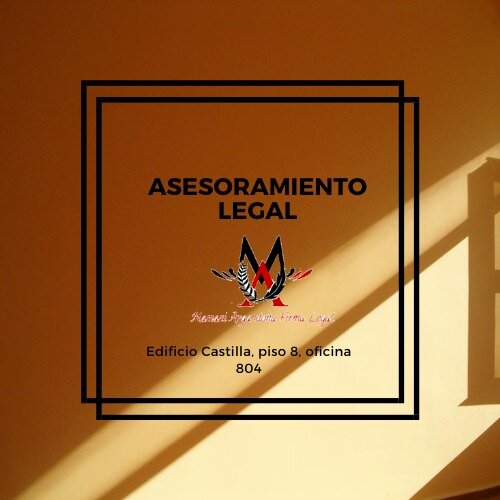Best Climate Change Law Lawyers in La Paz
Share your needs with us, get contacted by law firms.
Free. Takes 2 min.
List of the best lawyers in La Paz, Bolivia
About Climate Change Law in La Paz, Bolivia
Climate Change Law in La Paz, Bolivia, refers to a set of legal rules and regulations aimed at addressing and mitigating the impacts of climate change within the city and broader Bolivian territory. Bolivia’s approach to climate change is influenced both by national legislation and international commitments, such as those under the Paris Agreement. The law covers the responsibilities of public and private entities for reducing greenhouse gas emissions, protecting vulnerable ecosystems (like the high Andes), and promoting sustainable development. In La Paz, local ordinances and national regulations work together to implement climate action strategies, encourage renewable energy use, and ensure community adaptation to changing environmental conditions.
Why You May Need a Lawyer
There are several reasons individuals, businesses, and organizations in La Paz might seek legal assistance in climate change matters. You may need a lawyer if you are:
- Facing compliance issues with environmental regulations related to climate protection.
- Seeking permits for renewable energy projects or carbon offset schemes.
- Dealing with disputes regarding water use, deforestation, or land use that impacts the environment.
- Representing indigenous or local communities affected by climate-related government or private actions.
- Pursuing funding or legal recognition for climate adaptation and mitigation initiatives.
- Responding to the impacts of government climate policies on your business or property.
Legal counsel can help interpret evolving regulations, navigate administrative procedures, and represent your interests before local authorities or courts.
Local Laws Overview
In La Paz, the framework for climate change law operates through a combination of municipal, departmental, and national measures:
- National Framework: The Bolivian Constitution recognizes the rights of Mother Earth and the importance of harmonious interaction between humans and nature. The Law of Mother Earth (Law No. 71) and related statutes create broad obligations focused on ecological protection and respect for the environment.
- Municipal Regulations: La Paz has adopted local action plans in line with national climate strategies, prioritizing the reduction of emissions and adaptation projects. This includes rules for urban development, waste management, and energy efficiency.
- Environmental Licenses: Projects with potential environmental impacts must obtain proper licenses, complying with climate change mitigation guidelines and demonstrating minimal harm to local ecosystems.
- International Commitments: Bolivia, including La Paz, aligns local initiatives with global agreements like the Paris Climate Agreement and works to incorporate indigenous and community perspectives in climate governance.
Key legal aspects include sustainable land use planning, protection of water and forest resources, and mechanisms for public participation in environmental decision-making.
Frequently Asked Questions
What is climate change law in Bolivia?
Climate change law in Bolivia refers to all legal norms, regulations, and policies created to address and mitigate the impacts of climate change. It covers issues like emissions reduction, ecosystem protection, and community resilience.
Does La Paz have its own climate change regulations?
Yes, the municipality of La Paz has implemented local ordinances and action plans that complement national strategies and address the city’s specific environmental challenges.
Who enforces climate change law in La Paz?
Enforcement is carried out by various government bodies at the local, departmental, and national levels, including environmental authorities and municipal agencies, depending on the area of regulation.
Can individuals or businesses be fined for breaking climate change law?
Yes. Fines and other sanctions can apply to those who violate environmental regulations, such as unauthorized deforestation, excessive emissions, or improper waste disposal.
Are there incentives for renewable energy projects in La Paz?
There are both regulatory incentives and grant programs at the national and municipal levels to promote renewable energy adoption, with the aim of reducing fossil fuel dependence and emissions.
How does climate change law protect indigenous communities?
Bolivia’s legal framework recognizes the rights of indigenous peoples and communities, incorporating their traditional knowledge and participation in decisions about climate and environmental policy.
What permits are needed to start a climate-related project?
Projects with potential environmental impact usually require environmental licenses, which are obtained after an impact assessment and compliance with climate protection requirements.
Can I challenge a government decision related to climate change?
Yes, individuals and organizations can challenge decisions through administrative processes or before courts, particularly if the decision affects their rights or the environment.
Where can I find information about climate change law updates?
Updates are provided by government agencies like the Ministry of Environment and Water, the municipal government, and legal publications specializing in environmental law.
What should I do if my property is affected by climate adaptation projects?
If your property is impacted by public climate projects or regulations, you should consult a lawyer to understand your rights, possible compensation, and the procedures for contesting or negotiating with authorities.
Additional Resources
If you need help or more information about Climate Change Law in La Paz, you may refer to:
- Ministry of Environment and Water (Ministerio de Medio Ambiente y Agua): The national authority in charge of environmental and climate matters.
- Government of the Department of La Paz: Offers guidance on departmental climate strategies and legal processes.
- Municipal Government of La Paz: Implements and oversees local climate change action plans and regulations.
- Bolivian Center for Environmental Law and Sustainable Development (Centro Boliviano de Derecho Ambiental y Desarrollo Sostenible - CEDAB): Provides legal research and advisory services.
- NGOs and advocacy groups like Fundación Solón and Fundación Gaia Pacha support communities and provide resources regarding climate rights.
Next Steps
If you believe you need legal assistance with a climate change issue in La Paz, consider the following steps:
- Gather all relevant documents and information related to your matter, including permits, correspondence, and any official notifications.
- Contact a legal professional with experience in environmental or climate change law. You may want to seek referrals from local bar associations or environmental organizations.
- Consult with the lawyer to clarify your situation, determine your legal standing, and explore available options.
- If your issue involves government action, be prepared to engage in administrative processes or participate in public consultations.
- Stay informed about changes in local regulations and available support programs by following updates from government sources and legal news outlets.
Understanding and navigating Climate Change Law can be complex, but seeking professional legal advice ensures you can protect your rights, comply with the law, and contribute to sustainable outcomes for the La Paz community.
Lawzana helps you find the best lawyers and law firms in La Paz through a curated and pre-screened list of qualified legal professionals. Our platform offers rankings and detailed profiles of attorneys and law firms, allowing you to compare based on practice areas, including Climate Change Law, experience, and client feedback.
Each profile includes a description of the firm's areas of practice, client reviews, team members and partners, year of establishment, spoken languages, office locations, contact information, social media presence, and any published articles or resources. Most firms on our platform speak English and are experienced in both local and international legal matters.
Get a quote from top-rated law firms in La Paz, Bolivia — quickly, securely, and without unnecessary hassle.
Disclaimer:
The information provided on this page is for general informational purposes only and does not constitute legal advice. While we strive to ensure the accuracy and relevance of the content, legal information may change over time, and interpretations of the law can vary. You should always consult with a qualified legal professional for advice specific to your situation.
We disclaim all liability for actions taken or not taken based on the content of this page. If you believe any information is incorrect or outdated, please contact us, and we will review and update it where appropriate.









